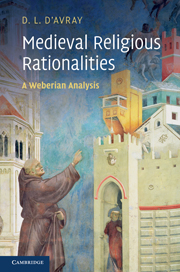Book contents
- Frontmatter
- Contents
- Preface and acknowledgements
- Abbreviations
- 1 Preliminaries
- 2 Medieval values: structures
- 3 Medieval values: dynamics
- 4 The value–instrumental interface in the Middle Ages
- 5 Formal rationality and medieval religious law
- 6 The formal–substantive interface and the dispensation system
- General conclusion
- Bibliography
- Index of manuscripts
- General index
Preface and acknowledgements
Published online by Cambridge University Press: 05 June 2012
- Frontmatter
- Contents
- Preface and acknowledgements
- Abbreviations
- 1 Preliminaries
- 2 Medieval values: structures
- 3 Medieval values: dynamics
- 4 The value–instrumental interface in the Middle Ages
- 5 Formal rationality and medieval religious law
- 6 The formal–substantive interface and the dispensation system
- General conclusion
- Bibliography
- Index of manuscripts
- General index
Summary
This book is a sequel to its sister volume Rationalities in History, though either can be read without the other. Anyone who does look at both will see that a common structure informs them. This is because they were shaped by the same Weberian questionnaire. While the sister volume attempts on a small scale to do with a few ideal-types what Weber did for analytical world history, the present volume applies the same ideal types to Western medieval ‘establishment’ religion. The aim is not to prove general laws or pass value judgements: ideal-types do not work like that. They generate empirical investigations into forms of thought and practice which otherwise easily remain amorphous in our conception of the period.
To begin my acknowledgements with institutions, I must thank the British Academy for the Research Readership during which I began this project long ago, the Alexander von Humboldt Stiftung for research visits to Munich funded by its programme for former fellows, and my UCL department for letting me teach unusual courses. As for individuals, the whole book is indebted to Bonnie Blackburn, Richard Kieckhefer and Julia Walworth. Patrick Zutshi, Peter Clarke and Barbara Bombi advised me on papal government. Claudia Maertl and Markus Wesche provided bibliography on Pius II, and John Bell on legal formality. This book and the sister volume have both been shaped by discussions in the Bloomsbury Sacred Law Group and above all with UCL students on the ‘History and Sociology of Rationality’ course, whom I cannot thank enough for their ideas and stimulation.
- Type
- Chapter
- Information
- Medieval Religious RationalitiesA Weberian Analysis, pp. ixPublisher: Cambridge University PressPrint publication year: 2010

